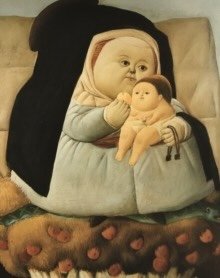The Howdie-Skelp
Cover of The Howdie-Skelp by poet Paul Muldoon
I came across this book cover when I was researching midwifery in the 1800s and loved the image and the title. A “howdie” was a name for a midwife and “skelp” is a slap, as in “I’ll gie ye a guid skelping!”
The howdie-skelp is therefore the slap given to newborns to wake them up.
I was thinking about my great great great grandmother Janet Chapman 1843, who gave birth to twelve children in the late 1800s. Two died when they were young so Janet had twelve healthy deliveries.
This was at a time when the infant mortality rate in Scotland was 13%
Janet Chapman (seated left) c 1890
Janet looks very trim (love those corsets) and beautiful in this photo, probably taken when she was about 46. She died at age 68 from cancer of the vulva, which is unusual. I wondered if she maybe used a carcinogenic ointment during her childbearing years. People used all kids of home remedies before modern medicine was available.
Her granddaughter, my nana Georgina Greenan 1911, used to take her children down to the road works to smell the tar when they had colds as she thought the smell would clear their congestion.
My own mum used talcum powder, which is now known to be carcinogenic.
Most children were born at home in Scotland in the 1800s, attended by a midwife who didn’t necessarily have any training. It wasn’t until the Midwives Act of 1915 that midwives had to take exams and prove their abilities.
Before that people relied on their reputation and in rural areas there were often few to choose from. Janet had her first child George Chapman Munro (my great great grandfather) in 1864 in Ross and Cromarty in the Highlands where she got married to the blacksmith George Gordon Smith Munro. They moved down to Leith shortly after his birth and all their other children were born in the city.
Janet would have had the option of chloroform to relieve labor pains (introduced in Edinburgh in 1847) but the big concern for pregnant women was puerperal fever. If the mother or infant got an infection either could die. Antibiotics didn’t come into general use until after penicillin was discovered in 1928.
Milestones in Midwifery in Scotland:
1847 Chloroform first used for pain by James Young Simpson in Edinburgh
1901 First maternity hospital staffed by women in Edinburgh
1915 Midwives Act established licensing in Scotland
1928 Penicillin discovered by Alexander Fleming (a Scotsman) in London
1948 National Health Service established with free care for all
My brother and I are part of the first generation to benefit from the National Health Service and modern scientific medicine. Somehow our ancestors made it without but we would probably not have as my mum had complications of childbirth in both our cases.

